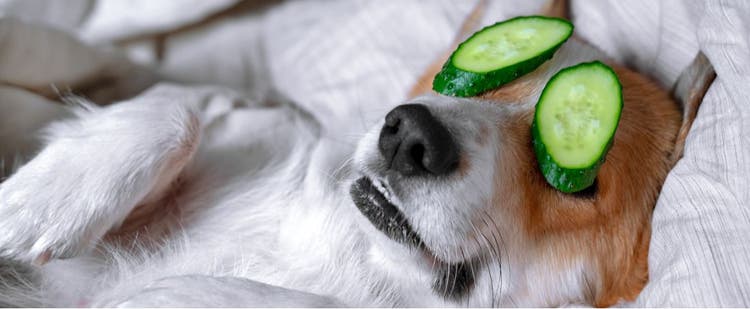
Can Dogs Eat Cucumbers?
Cucumbers are a low calorie and delicious snack that can be easily incorporated into your dog’s diet. They just might become your dog’s favorite new addition to their routine.
Health Benefits of Cucumbers
Cucumbers have a high water content and can be very refreshing.
A few health benefits of cucumbers include:
- Low Calorie. 1 cup of cucumbers contains 16 calories
- Low Fat. 1 cup of cucumbers contains 0 grams of fat
- Low Sodium. 1 cup of cucumber contains 2 mg of sodium
Cucumbers are also a good source of vitamins (like vitamin C and vitamin K) and vital electrolytes. They also provide magnesium, potassium, and manganese to a balanced diet.
They have also been shown to be a source of antioxidants. In humans, cucumbers have proven helpful in fighting estrogen-related cancers, though these findings have not been documented in dogs and cats. This same research group noted that cucumbers contained carotene and flavonoids, which can help with inflammation and aging changes in cells. While we don’t have research directly relating these findings to our veterinary patients, we are extrapolating that they may share some of the same benefits.
On top of that, cucumbers are a good source of fiber and can help with digestion. Fiber consumption can prevent constipation and promote bowel regularity and digestion. Because of the cucumber’s high water content and fiber, eating them can help your dog feel full and satisfied.
What Precautions Should Be Taken When Feeding Cucumbers to a Dog?
Everything should be done in moderation. Introducing a new food item into your dog’s diet should always be done slowly and in very small amounts. Cucumbers, while being generally very safe, can cause gastrointestinal upset or an allergic reaction (though very unlikely). If your dog does not tolerate cucumbers when introduced, hold off on giving them anymore.
Rule of 10%
Cucumbers are treats, which should not make up more than 10% of your dog’s total calorie intake per day. Your veterinarian can help you calculate your dog’s ideal calorie intake and then you can divide out how many snacks fit into that calorie allotment.
Avoid Pickles
Pickles are technically cucumbers, but the pickling process may contain spices that are toxic to dogs, such as garlic or onion. They may also contain sugar, vinegar, and other pickling ingredients that are not recommended for pets. Hold off on pickles and stick to fresh cucumber.
Make Sure They’re Fresh
Avoid any cucumbers that are rotten, moldy, or aged. Cucumbers should be fresh when given as snacks. It is generally recommended to feed produce within 5 days of purchasing. Always make sure a cucumber is green, firm, and looks healthy prior to serving. Throw away if soft, moldy, foul smelling, or rotten.
Make Sure They’re Bite-Sized
Avoid feeding whole cucumbers, since they are choking hazards and difficult to digest. Always cut a cucumber into small manageable pieces when feeding. Whole cucumbers should not be fed as a treat or given as a chew toy, because large pieces could be inadvertently swallowed and cause an obstruction. In addition, your dog should only eat cucumbers when supervised.
Fun Summer Snack Tip
Refrigerating cucumber pieces for your dog is a refreshing treat after a long walk or a run around the yard, especially during the summer. With warmer months ahead, try adding chilled cucumbers into your dog’s snack lineup.